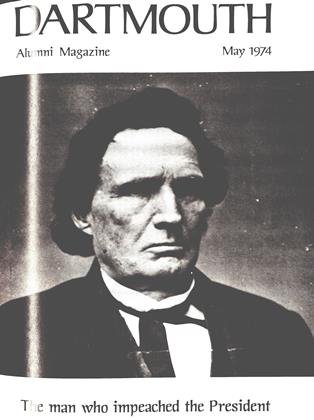By AndrewJames Purdy '60. Designed and Illustrated byDavid Itchkawich. New York: The Smith1973 by Arrangement with Horizon Press.Printed in England by Villiers PublicationsLtd., London. 80 pp. $10. Limited Edition of 500 Numbered Copies.
Seventeenth-century croquet was simple enough. All any nitwit or deep thinker needed were ten hoops, a ball, a mallet, and an uncomplicated set of rules. With as few stroke as possible, run your ball through the hoops and knock it against a peg. In the nineteenth century, championship games were played at Wimbledon and any place offering a lawn made festive with a garden party. But modern croquet is scientific, esoteric, finically preoccupied with the laying of lawns, selection of mallets, and making of balls. With a true lawn as carefully cultivated as a golf green and with a knowledge of tactics today's game can be as skillful as billiards.
Creating a phantasmagoric world where croquet is the supreme game played for the highest stakes and penalizing most cruelly for failure Mr. Purdy is ultra-modern sports reporter painter, philosopher, and novelist. With plenty of action his croquet is billiards with a touch of chess. Over the playing field he casts lights that obfuscate as much as they illumine: dark and brilliant greens of court wall, wooden galleries and verandas, and lawn. A ball shines red against the players' white jackets and white trousers and the scarlet and black of court edges. Beyond the lights, darkness hovers high overhead. One is reminded of a movie baffling the eye with a montage of distracting sounds and images. On shining grass slither red, blue, and yellow balls. The dome of darkness envelops "imaginary" vision. Onlookers murmur unintelligibly, and the pure voice of a mysterious woman speaks words the hero cannot understandstand.
The story may be read on two levels: (1) The strategy and moves, ruthless but umpired, complicated, powerful, with an appeal to specialized sportsmen and (2) the game as will-o'-the-wisp allegory. What price, in croquet and modern business, fierce competition, complicated rules. judges, and galleries of applause? The young contestant for a Mastership will settle for nothing less than victory according to rules set up and administered by starchy organization executives, here called judges, all Past Masters, dressed in white ties and tails, moving with Portentous solemnity, and by stewards in long scarlet coats and black hats.
"The hero plays the game with tricky finesse, control of fluttering pulses and sweating palms, judicious application of rosin, nursing of mallet heads, and desperate gambles. One error is nearly fatal. With an overplay his ball flies out of bounds. Facing disqualification, he is given limited time to find it. Thrashing about in the dark primeval jungle beyond the lighted civilized croquet world-center, he views the rotling and mutilated corpse of an eliminated player, incurs minor cuts and scratches from sharp twigs, runs ever wilder risks, grabs a huge thorn that bloodily embeds itself in his delicate croquet hand, falls down a cliff, and almost knocks himself out.
Offering a different kind of victory, the earlier lawn woman with the enigmatic voice tempts him with lovely face, jingling bracelets, bare feet, and enticing breasts. "Why go back?" Dizzily with his mallet he hits her outstretched hand. On the competitive lawn, bandaged and patched, he out-manoeuvres his opponents. Victory and the supreme symbol: a master's jacket. In the locker room he is forced to swap banter, Scotch-whisky style, with croquet contestants and finishes by drinking too much. He returns home with deepening sadness and a conviction that "man's highest achievement brings with it, not joy or elation, but, being done, only regret."
 View Full Issue
View Full Issue
More From This Issue
JOHN HURD'21
-
 Class Notes
Class Notes1921
April 1976 By HAROLD F. BRAMAN, G. HARRY CHAMBERLAINE, JOHN HURD'21 -
 Books
BooksFIRST PERSON: CONVERSATIONS ON WRITERS AND WRITING WITH GLENWAY WESCOTT, JOHN DOS PASSOS, ROBERT PENN WARREN. JOHN UPDIKE. JOHN BARTH, ROBERT COOVER
March 1974 By JOHN HURD'21 -
 Books
BooksALFRED LORD TENNYSON: IN MEMORIAM. AN AUTHORITATIVE TEXT, BACKGROUND AND SOURCES, CRITICISM.
May 1974 By JOHN HURD'21 -
 Books
BooksThe Eye of the Beholder, Squinting
April 1975 By JOHN HURD'21 -
 Books
BooksMetals and Living Flesh
March 1976 By JOHN HURD'21 -
 Books
BooksFields of Grace
September 1976 By JOHN HURD'21
Books
-
 Books
BooksALL THE BEST IN SCANDINAVIA.
OCTOBER 1968 By BETTY HOEG HAGEN -
 Books
BooksALL THE BEST IN JAPAN AND THE ORIENT INCLUDING HONG KONG, MACAO, TAIWAN AND THE PHILIPPINES.
JUNE 1964 By DONALD BARTLETT '24 -
 Books
BooksWOODSMOKE AND WATER CRESS.
JANUARY 1966 By JOHN HURD '21 -
 Books
BooksSOCIETY AND CULTURE.
February 1962 By RALPH P. HOLBEN -
 Books
BooksSCIENCE AND THE UNSEEN WORLD
APRIL 1930 By W. M. Urban -
 Books
BooksTHE ROAD TO RENO.
June 1962 By W. R. WATERMAN
JOHN HURD'21
-
 Class Notes
Class Notes1921
April 1976 By HAROLD F. BRAMAN, G. HARRY CHAMBERLAINE, JOHN HURD'21 -
 Books
BooksFIRST PERSON: CONVERSATIONS ON WRITERS AND WRITING WITH GLENWAY WESCOTT, JOHN DOS PASSOS, ROBERT PENN WARREN. JOHN UPDIKE. JOHN BARTH, ROBERT COOVER
March 1974 By JOHN HURD'21 -
 Books
BooksALFRED LORD TENNYSON: IN MEMORIAM. AN AUTHORITATIVE TEXT, BACKGROUND AND SOURCES, CRITICISM.
May 1974 By JOHN HURD'21







